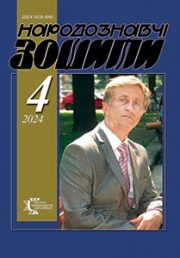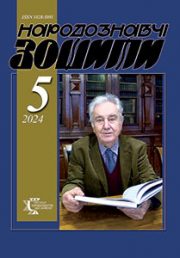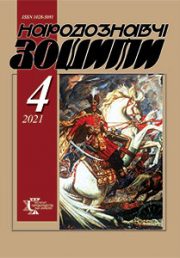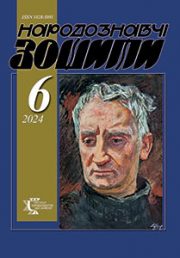The Ethnology Notebooks. 2018, 1 (139), 91–102
UDK 94(477):323(=161.2)-055.2
DOI https://doi.org/10.15407/nz2018.01.091
Received 26.12.2017
A «WOMAN’S QUESTION» IN THE OUN IDEOLOGY AND PROPAGANDA
Kis Oksana, candidate of sciences in history,
Senior Researcher at the Institute of Ethnology
of the National Academy of Sciences of Ukraine,
departmeny of social anthropology.
Svobody Avenue 15, 79000, Lviv, Ukraine.
Contacts: e-mail: oksanakis55@gmail.com
Abstract. This article explores the vision of women’s roles and tasks in the national project from the perspective of the Organization of Ukrainian Nationalists. Analysis of the texts of the prominent Ukrainian nationalists (Yuriy Lypa, Olena Teliha, Daria Rebet) and respective OUN propagandist publications allowed to reveal the core elements of the image of an «ideal Ukrainian woman» against the backdrop of the discussion with the interwar feminists. Nationalists’ essentialist perceprion of women reduced thair main duty to motherhood (aimed at physical and cultural contibuity of the nation) and subordination of all women’s interests, potentials and activities to the goals of the national cause..
Keywords: Ukrainian women, OUN, nationalism, essentialism, feminism.
REFERENCES
HDA SBU (Haluzevyj derzhavnyj arkhiv Sluzhby bezpeky Ukrainy). F. 13. Spr. 376. T. 48. 441 ark. (Materyaly y dokumenty OUN po zhenskomu voprosu, y zhyzny y tvorchestve ukraynskykh pysatelej Tarasa Shevchenko y Lesy Ukraynky, o prazdnyke moria y dr.: v odnom tome).
HDA SBU. F. 13. Spr. 376. T. 48. Ark. 1–8a (Ukrains’ka zhinka v suchasnij dijsnosti. Viddil kul’turnoi pratsi U.Ts.K. Holovna zhinocha sektsiia. Dodatok do Visnyka UTsK. 1943. № 5).
HDA SBU. F. 13. Spr. 376. T. 48. Ark. 14–22 (Rebet Dariia. Suspil’na rolia zhinky. Viddil kul’turnoi pratsi pry U.Ts.K. Holovna zhinocha sektsiia. 1943. Ch. 4).
HDA SBU. F. 13. Spr. 376. T. 48. Ark. 9–13 (Rak M. Do pytannia pryznachennia ukrains’koi zhinky).
HDA SBU. F. 13. Spr. 376. T. 48. B. a. B. d. Ark. 342 zv.–346 zv. (V richnytsiu smerti Ol’hy Basarab).
Havryshko, M. (2011). Vplyv «hendernoi polityky» u Tret’omu Rajkhu na ukrains’kyj feministychnyj dyskurs v Halychyni u 1930-kh rr. Ukrainoznavchyj al’manakh. Vyp. 6. Pp. 86–90.
Diadiuk, M. (2011). Ukrains’kyj zhinochyj rukh u mizhvoiennij Halychyni: mizh hendernoiu identychnistiu ta natsional’noiu zaanhazhovanistiu. L’viv: Astroliabiia.
Lypa, Yu. (1938). Ukrains’ka zhinka. Zhinka. № 7–8. Kviten’. Pp. 2–4.
Lial’ka, Ya. (2007). Ol’ha Basarab ta ii doba. L’viv: Halyts’ka vydavnycha spilka.
Posivnych, M. (2014). Zhinka v provodi OUN: Dariia Rebet – «Orlian». «I slova staly chynom zhyvym…» (Borot’ba OUN ta UPA kriz’ pryzmu liuds’kykh dol’ ta stosunkiv): Zbirnyk istoryko-biohrafichnykh narysiv. L’viv: Instytut ukrainoznavstva im. I. Kryp’iakevycha NAN Ukrainy, pp. 147–176.
Rudnyts’ka, M. (1998). Statti, lysty, dokumenty. L’viv: TsDIA Ukrainy.
Anthias, F., Yuval-Davis, N. (1994). Women and the Nation State. Nationalism: The Reader. Oxford: Oxford UP, pp. 312–316.
Stasiuk, O.J. Basarab Ol’ha. Entsyklopediia istorii Ukrainy. T. 1: A-V. URL: http://www.history.org.ua/?termin=Basarab_O.
Teliha, O. (1977). Yakymy nas prahnete? Zbirnyk. Detrojt: Ukrains’kyj zolotyj khrest v ZSA, pp. 65–77. URL: http://sites.utoronto.ca/elul/lit-crit/Feminism/Teliha-Iakymy.html.
Lypovets’kyj, S. (2009). Rozvidnytsia Ol’ha. Ukraina Moloda. 2 ver. URL: http://www.umoloda.kiev.ua/number/1481/169/ 52083/.
Pam’iaty Ol’hy Besarabovoi. Surma. Orhan UVO. Ch. 2–3 (17–18). 1929. Liu-ten’–berezen’. Pp. 7–8. URL: http://ounuis.info/archive/library/Newspapers/surma.html.







